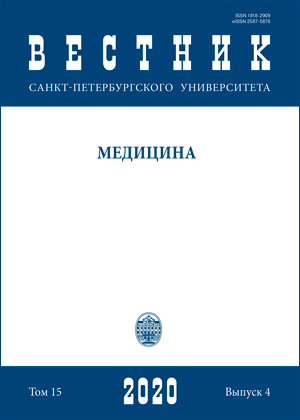Influence of reproductively significant autoantibodies on the quality of oocytes, obtained embryos and the chances of implantation in Assisted Reproductive Technologies cycles. Literature review*
DOI:
https://doi.org/10.21638/spbu11.2020.404Аннотация
There is evidence suggesting that autoimmune mechanisms may influence fertility, manifesting as infertility or pregnancy loss. Numerous autoimmune diseases, including but not limited to systemic lupus erythematosus, anti-phospholipid syndrome and Hashimoto thyroiditis may be associated with infertility and pregnancy loss through different putative mechanisms. It is notable that fertility may be impaired in the presence of serum autoantibodies regardless of the presence of a clinically overt autoimmune disease. Autoimmunity may affect all stages of fertility via ovarian failure, implantation failure, and pregnancy loss. This review article will illustrate and discuss the available data on the link between chances of achieving pregnancy through Assisted Reproductive Technologies in real clinical setting in the presence of several autoantibodies affecting female reproductive system. Summarizing the available data from the world literature, it can be concluded that necessity exist in development of a reproductively significant antibodies line in application to direct, cross-over and cumulative assessment of the role of autoimmune antibodies carriage in the implementation of reproductive failures,bearing in mind new approaches to the strategy of overcoming autoimmune reproductive failure.
Ключевые слова:
autoantibodies, TPO, APA, ANA, α-enolase, laminin-1, Se-binding protein 1
Скачивания
Библиографические ссылки
References
Aldieri E., Diletta D’Eufemia M. D., Evangelista F., Colacurci N., Benedetto C. Oocyte polarized light microscopy, assay of specific follicular fluid metabolites, and gene expression in cumulus cells as different approaches to predict fertilization efficiency after ICSI. Reprod. Biol. Endocrinol., 2017, no. 15,vol. 1, p. 47.
Загрузки
Опубликован
Как цитировать
Выпуск
Раздел
Лицензия
Статьи журнала «Вестник Санкт-Петербургского университета. Медицина» находятся в открытом доступе и распространяются в соответствии с условиями Лицензионного Договора с Санкт-Петербургским государственным университетом, который бесплатно предоставляет авторам неограниченное распространение и самостоятельное архивирование.




